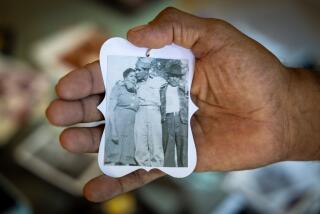On La Verne Avenue, They Ask: ‘Why Is Saddam Still in Iraq?’
- Share via
La Verne Avenue, the working-class Chicano neighborhood that gained worldwide attention during the Persian Gulf War, is quieter these days. The nosy reporters and the ubiquitous TV trucks, which came to chronicle the La Verne families that had sent five of their sons to Operation Desert Storm in 1991, are gone.
But the dogs still bark at strangers, and U.S. flags and Gulf War banners still fly over the homes of some of the street’s residents.
And sentiments along the East L.A. street haven’t changed about Saddam Hussein. The La Verne residents still hate him.
When the U.S. military went into action this week against Iraqi forces, the feeling on La Verne was that the Gulf region will continue to be unstable as long as Hussein is around.
“We should have taken him out during Desert Storm [in 1991] when we had the chance,” growls La Verne resident Steve Reyes. “Why are we still messing around with him?” Chimes in his wife, Rachel, “He’s dangerous.”
Raul Velasquez, a neighbor from up the street, uses some local lingo to sum up the seemingly unanimous
verdict on La Verne: “Ese vato es loco. . . . Enough already, let’s dust his butt.”
*
Understandably, any topic that deals with Hussein or the Persian Gulf evokes a strong reaction on La Verne.
The modest home of Steve and Rachel Reyes, whose sailor son, Tim, was on the aircraft carrier Saratoga in the Gulf, became a familiar sight to many Times readers and TV viewers in 1991. Relatives, neighbors and total strangers converged there to hear the latest news about the sons in the conflict.
Visitors from as far away as Italy, who had heard of the street on CNN and other news outlets, came by to wish La Verne the best of luck.
The five men--two Marines, two Army grunts and Tim Reyes, the sailor--returned home safely to tumultuous street celebrations. Those occasions allowed La Verne’s residents to exude pride in the five as well as vent frustrations over outside perceptions about East L.A. and whether they were loyal Americans.
Some of the five have since moved elsewhere, readjusting to civilian life. But Hussein is never very far from their thoughts.
“I think he’s a menace [to the Gulf region],” Tim Reyes said the other day during a visit to his parents’ home. “I feel strongly about [toppling Hussein from power]. We should have done the job completely before, but that wasn’t my decision. Put somebody else in charge [in Iraq] or get him out of power.”
Reyes said two other La Verne veterans from the Gulf War, William Martinez, who served with the Army’s 82nd Airborne Division in the ground war against the Iraqis, and former Marine Joey Villarreal Jr., agree with him.
“They say, ‘Why is Saddam still in Iraq?’ ”
*
When the local news coverage this week focused on events in Iraq, Reyes began to understand the frets and worries that La Verne neighbors experienced during the Gulf War more than five years ago.
“You don’t think about it over there,” Reyes says. “But in watching the news now, I couldn’t help seeing the worried looks on the [soldiers’] faces. My heart and prayers go out to them.”
La Verne is a closely knit neighborhood where a tragedy, like last weekend’s fire that gutted a nearby warehouse, can bring residents closer together.
Few residents seem eager to see the TV trucks rolling in again. They want their privacy. Some residents and veterans sent word that they are proud of their military service, and still hate Hussein, but would rather not talk about it publicly.
“They’re still adjusting to civilian life,” one La Verne regular explained, noting that some have had trouble finding steady work.
Reyes, 25, who says he is still adjusting, is studying to become a Los Angeles police officer.
“I don’t regret joining the Navy or going to the Persian Gulf,” he says. “I hope this police job works out.”
Reyes’ mother, Rachel, who gladly gave countless interviews to reporters who came by in 1991, still has her neighbors in stitches about her response to a request for an interview with CNN.
“Why should I talk to CNN?” she said then. “I don’t even have cable.”
This week, she said with a grin, “I still don’t have cable.”
More to Read
Sign up for Essential California
The most important California stories and recommendations in your inbox every morning.
You may occasionally receive promotional content from the Los Angeles Times.













